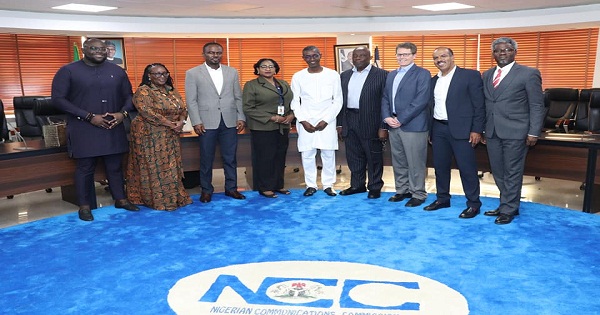Telecom
Facebook Calls for Robust Infrastructure Deployment to Bolster Digital Culture, Seeks NCC Partnership

Facebook, a digital services provider has called for governments’ collaboration and partnership for infrastructure deployment to strengthen connectivity, enhance businesses and bolster citizens’ embrace of digital culture.
They disclosed this when its Top Management staff paid a working visit to the Nigerian Communications Commission (NCC) in Abuja recently.
Underscoring the centrality of infrastructure to the flourishing of digital culture, Ibrahima Ba, Network Investment Lead at Facebook Office in the United States, who led the Facebook delegation to NCC, stated that robust infrastructure is the bedrock of the massive connectivity that signposts Facebook, WhatsApp and Instagram, because without adequate and right type of infrastructure there can be no robust connectivity.
Ba recalled that Facebook had successfully undertaken two connectivity projects in Edo and Ogun involving a total of 800 kilometers of fibre connecting institutions and operators towers.
He said that, considering the connectivity gap that still exists in the country, there is a great need for more and even further expansion of infrastructure because increased penetration of services will require further deployment of infrastructure which will encourage investment and promote digital culture.
According to Ba, Nigeria is very important to Facebook for many reasons but particularly because it is Africa’s most populous country.
Hence the desires and dedication by Facebook to explore further opportunities for partnerships in infrastructure expansion.
He emphasised that Facebook looks forward to seeing opportunities for partnerships manifest because such collaboration will result in kilometres of infrastructure expansion in fibre connectivity.
He advised the Commission to facilitate further liberalisation of partnership and collaboration processes with stakeholders.
Edoyemi Ogoh, deputy Director Technical Standards and Network Integrity at NCC, who led the team that received the Facebook delegation on behalf of the Executive Vice Chairman and Chief Executive (EVC/CE) of NCC, Prof. Umar Danbatta, thanked the Facebook team for the visit.
He commended the group for the model it has adopted in participating in the Nigerian market by partnering with licensees of the Commission, and assured the team of NCC’s irrevocable commitment to infrastructure expansion to enhance better connectivity.
He affirmed that NCC is aware of how central infrastructure is to the expansion of telecom services, and said that the realisation explained NCC’s adoption of the Open Access Model (OAM) and the licensing of infrastructure companies (Infracos) to cascade fibre to the hinterland of Nigeria.
Ogoh also informed the guests that President Muhammadu Buhari’s recent re-designation of NCC’s supervising ministry as Ministry of Communications and Digital Economy speaks further to Federal Government’s commitment to encouraging more citizens to embrace digital culture.
He declared that the Commission is central to these processes, and the Minister of Communications and Digital Economy, Dr. Isa Ali Ibrahim Pantami, has continued to also demonstrate his commitment to tackling bottlenecks to infrastructure expansion.
He cited the recent meetings between the Minister, the EVC and Dr. Kayode Fayemi, the Governor of Ekiti State and Chairman of Nigerian Governors Forum (NGF) which focused on streamlining and standardizing Right of Way (RoW) charges as eloquent testimony to Government’s commitment in this regard.
Ogoh also stated that the Commission is finalising processes to institute the ‘Dig Once Policy’ that will encourage operators and other key players in infrastructure segment to have greater strategic collaboration in the laying of fibre especially in the context of the upcoming National Broadband Plan 2020-2025.
Ba came to NCC with four of his colleagues – Erik Schmidt, Network Strategy Manager, Facebook Infrastructure; Adaora Ikenze, Head West Africa (Public Policy); Imran Abass, Partner Manager, Sub Sahara Africa; and Fargani Tambeayuk, Africa Public Policy Manager (Connectivity).
In a note of thanks and closing remarks by Jerry Ugwu, Deputy Director Legal and Regulatory Services at NCC, the Commission expressed delight at the meeting, which was initiated by Facebook.
He said NCC will explore the proposition by Facebook further and hope that discussions with Facebook will continue in order to give concrete expressions to the desires and vision of the two organisations.
Telecom
NCC Asks Consumers to Monitor Data Usage to Authenticate Consumption

Nigerian Communications Commission (NCC) has charged the over 174 million telecoms subscribers in the country to constantly monitor their data usage to authenticate their consumption level.

This follows concerns being raised by telecoms consumers about the rapidity of data depletion on their devices.
The Commission particularly enjoined the consumers to always contact their service providers to make requests for cases of discrepancies noted in their data usage.
While the consumers are expected to contact their service providers to request for their usage history/statement where inconsistency exists in their data usage as first step, the Commission said they may also escalate such issues to the Commission through its toll-free Number 622 and social media platforms, especially if their requests are not satisfactorily handled.
The Commission, which also made some clarifications regarding the concerns being raised by the consumers around data usage, said the need to inform the consumers on their concerns is part of its commitment to protect and appropriately inform and educate the telecom consumer on industry issues.
Making further clarifications around data speed and usage, the Commission said data speed is the speed at which data is transferred between two devices, measured in megabits per second (Mbps or mbps), stressing that given the spread of Internet services and the immense investment in the sector, data rates have continued to increase and users may be unaware of how to measure data speed.
The telecoms regulator explained further that websites such as www.fast.com also provide an easy way for consumers to measure Internet speed on any device at any location.
“The higher the data speed, the quicker pages load-downloads and uploads-occur and expectedly, the quicker data bundles are exhausted. So, as telecom consumers are able to do more on devices in less time, some consumers’ devices & network service providers make it possible to limit data speed to help users manage data usage better.
“In any case, most devices now include functions to measure data used by devices and it is imperative that users monitor same to authenticate data usage, such as applications left running on devices. Therefore, where discrepancies occur users may contact their service provider to request for their usage history/statement. If request is not dealt with satisfactorily then, users can contact NCC by calling 622 or engage the Commission via its social media platforms”.
It added that the data usage experience is a function of location, network equipment and users connected in a particular location.
Telecom
Phone Theft: AMCODET Urges Mandatory Registration @ Point of Purchase

Association of Mobile Communication Device Technicians of Nigeria (AMCODET), has called on the Nigerian Communications Commission (NCC) to make it mandatory for mobile phones to be registered at the point of purchase.

According to Kehinde Apara, president of AMCODET, implementing this registration process would significantly help in combating phone theft and assist in locating stolen devices.
Apara, made this appeal in an interview in Lagos on Monday.
He stated, “Registration of mobile phones will reduce theft to the barest minimum, as it will be difficult for thieves to sell registered stolen phones.”
Apara explained that the registration of new phones would also help to reduce the harassment faced by technicians by security agencies.
“So many of our members have been labelled accomplices in theft cases, because customers bring stolen phones to them to repair. We believe this is unfair to such innocent people,” he said.
He went on to highlight that the NIN-SIM linkage, which was originally an idea brought forward by AMCODET, was created to curb insecurity and theft.
However, Apara pointed out that “It is not enough.”
He stressed the need for further measures to ensure the proper registration of mobile phones, emphasising that such a step would make it easier for technicians to identify stolen devices brought in for repair or flashing.
“AMCODET has been at the forefront of organising seminars on the security of mobile phones and has also been sensitising the public and authorities on the challenges faced by the association due to phone theft. There is no way our members can identify if a phone is stolen when brought to them for repairs or flashing, but if the phone is registered, the technician can more easily identify it,” he explained.
Apara also expressed a desire for closer collaboration with security agencies, saying, “We want to work with security agencies to ensure that phones are properly registered, theft is prevented, and thieves are brought to book.”
In additin to the call for phone registration, Apara appealed to individuals and the private sector to support efforts to develop the mobile phone industry in Nigeria.
He remarked, “We need individuals’ support to develop our industry, rather than relying on government for everything.”
He emphasised that Nigeria has the capacity to develop its own technology and reduce reliance on imported devices, “With the support of individuals and the private sector, Nigerians can begin to develop its own technology, rather than relying on imported technology.”
Apara expressed optimism for the future of the mobile phone industry in Nigeria, believing that with the right support, the country could build its own technological solutions and move towards greater self-reliance.
“We can develop our own technology.”
“But we need the support of individuals and organisations to make it happen,” he said.
Credit: NAN
Telecom
Apple Faces €150M Fine in France Over Alleged Antitrust Violations

French antitrust regulators have fined Apple 150 million euros ($162 million) over its App Tracking Transparency (ATT) feature, which is facing scrutiny in multiple European countries.

The French Competition Authority ruled that Apple’s implementation of ATT was “neither necessary nor proportionate to the company’s stated goal to protect user data” and unfairly penalized third-party publishers.
Alongside the financial penalty, Apple has been ordered to publish the decision on its website for seven days. The ruling comes amid ongoing investigations in Germany, Italy, Romania, and Poland into ATT, which Apple introduced in 2021 as a privacy safeguard.
ATT requires apps to obtain explicit user consent via a pop-up before tracking activity across other apps and websites. If users decline, the app loses access to their advertising identifier, limiting targeted advertising. Critics argue that the system disproportionately benefits Apple by restricting competitors while promoting its own advertising services.
The French watchdog found that ATT forces users to navigate excessive consent windows for third-party apps on iPhones and iPads, making the process unnecessarily complicated.
Additionally, Apple’s system requires users to opt out of ad tracking twice rather than once, which the authority said undermines the feature’s neutrality and causes economic harm to app publishers and ad service providers.
The ruling emphasized that smaller publishers, which rely heavily on third-party data collection for revenue, are particularly affected.
The French regulator initially declined to impose emergency measures in 2021 after complaints from the advertising industry, but continued its investigation, ultimately leading to Monday’s decision.

 Telecom1 day ago
Telecom1 day agoMTN, Lynk Global Make Africa’s First Satellite-to-Mobile Call

 General News1 day ago
General News1 day agoSERAP Asks National Assembly to Drop Bill to Jail Nigerians who Fail to Vote

 E-Business1 day ago
E-Business1 day agoSystemSpecs’s Subsidiary Deelaa Becomes Whatadeal

 E-Financial1 day ago
E-Financial1 day agoNigeria Gets Fresh $500m World Bank Loan for Economic Stimulus Programme

 E-Financial1 day ago
E-Financial1 day agoUninsured Depositors of Heritage Bank to Receive Liquidation Dividends In April – NDIC

 E-Business1 day ago
E-Business1 day agoCybersecurity Firm Says It’s Time to Back it Up, As the World Marks World Backup Day

 Telecom1 day ago
Telecom1 day agoSmart Treasure Investment Team’s Initiatives Eradicate Poverty, Says Aminu

 General News1 day ago
General News1 day agoFG to Elevate Enugu Tech Festival to National Event – Minister















